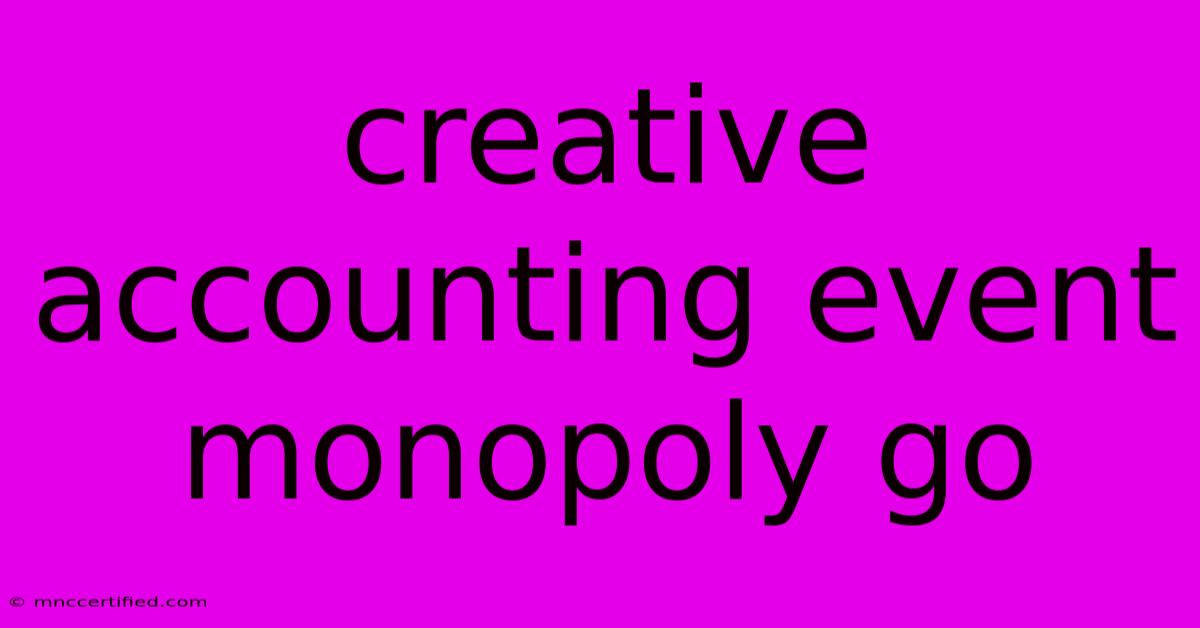Creative Accounting Event Monopoly Go

Table of Contents
Mastering the Art of Creative Accounting: A Monopoly Game Twist
Monopoly, the classic board game, is known for its simple rules and its ability to spark heated competition. But what if we injected a twist, a layer of complexity that mirrors the real world of business and finance? Enter Creative Accounting Monopoly, a game that challenges players to strategically manipulate their financial records to gain an edge over their competitors.
The Rules of the Game
Creative Accounting Monopoly follows the basic framework of the original game, with players buying properties, building houses and hotels, and ultimately aiming to bankrupt their opponents. However, here's where it gets interesting:
- Financial Statements: Instead of simply tracking cash flow, players now maintain detailed income statements and balance sheets. These documents become the foundation for their financial decisions.
- Creative Accounting Techniques: Players can utilize a variety of creative accounting methods to manipulate their financial records. This includes techniques like:
- Accelerating revenue recognition: Recognizing revenue earlier than it is actually earned.
- Delaying expense recognition: Pushing expenses to a later period.
- Using off-balance sheet financing: Hiding liabilities from the balance sheet.
- Changing accounting policies: Switching to a more favorable accounting method.
- Auditors: The game introduces "auditors" who randomly inspect players' financial statements. If an auditor finds inconsistencies or questionable practices, the player faces penalties like fines or even forced sale of properties.
- Winning the Game: The objective remains the same - drive your opponents to bankruptcy. However, players can also win by having the highest net income at the end of a predetermined number of rounds.
Benefits of Playing Creative Accounting Monopoly
This game offers several benefits, both for entertainment and educational purposes:
- Enhanced Financial Literacy: By experiencing the mechanics of financial reporting and creative accounting, players develop a deeper understanding of these concepts.
- Strategic Thinking and Decision Making: Players must carefully consider the consequences of their accounting choices, balancing the need for short-term gains with long-term sustainability.
- Risk Management: The possibility of audits and penalties encourages players to think critically about risk and its impact on their financial position.
- Fun and Engaging Learning: Creative Accounting Monopoly transforms a familiar game into a more complex and thought-provoking experience.
How to Play Creative Accounting Monopoly
You can easily adapt your existing Monopoly set for this version. Here's a simple guide:
- Prepare Financial Statements: Create basic income statement and balance sheet templates for each player.
- Establish Creative Accounting Techniques: Define a list of allowed accounting methods and their corresponding penalties.
- Introduce Auditors: Create cards or a dice roll mechanic to randomly trigger audits.
- Set Winning Conditions: Determine the game's duration and the criteria for victory (bankruptcy or highest net income).
The Ethical Implications of Creative Accounting
It's crucial to emphasize that while this game explores creative accounting techniques, it's important to understand the ethical implications involved. In real-world business, creative accounting can be used to mislead investors and stakeholders and can have serious legal consequences.
This game serves as a thought experiment to explore the complexities of financial reporting and to highlight the importance of ethical accounting practices. By understanding the potential consequences of manipulating financial statements, players can develop a greater appreciation for the importance of transparency and accountability in the business world.
Conclusion
Creative Accounting Monopoly offers a fun and engaging way to learn about financial reporting, accounting techniques, and ethical considerations in business. It challenges players to think strategically, manage risk, and understand the potential consequences of their decisions. By incorporating this unique twist into your next Monopoly game, you can transform a classic game into a valuable learning experience.

Thank you for visiting our website wich cover about Creative Accounting Event Monopoly Go. We hope the information provided has been useful to you. Feel free to contact us if you have any questions or need further assistance. See you next time and dont miss to bookmark.
Featured Posts
-
Brown And Brown Insurance Competition
Nov 10, 2024
-
How Much Is Toradol Without Insurance
Nov 10, 2024
-
Cheap Car Insurance In Beaumont Texas
Nov 10, 2024
-
Afghanistan Vs Bangladesh 2nd Odi Najmul Hossains Impact
Nov 10, 2024
-
Auto Insurance For Illegal Immigrants
Nov 10, 2024